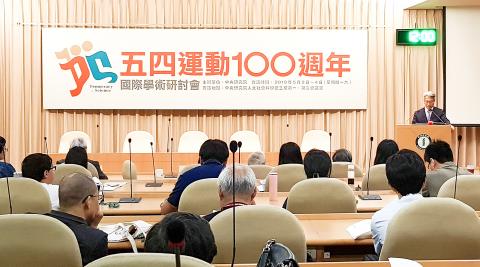Academia Sinica yesterday began a three-day conference in Taipei to mark the centenary of the May Fourth Movement, with Academia Sinica president James Liao (廖俊智) saying that academic research must be independent and free of the yoke of political ideology.
The movement was triggered by a massive student protest in Beijing on May 4, 1919, against the then-Chinese Nationalist Party (KMT) government’s inaction in the face of intrusive foreign powers, which led to young people pursuing democracy and science.
In his opening remarks, Liao highlighted the founding of Academia Sinica as inheriting the movement’s spirit of developing science, liberty, democracy and creativity.

Photo: Chien Hui-ju, Taipei Times
The institution was established in China in 1928 when the then-KMT government was based there. It relocated to Taiwan in 1949 following its defeat in the Chinese Civil War.
Academics should adhere to professionalism and independence even when dealing with highly politicized scientific issues, Liao said.
The movement can be described as a moral revolution, given that it led to enlightenment in different aspects of life, such as changing views about marriage with reduced emphasis on parental wishes, Academia Sinica vice president Huang Chin-shing (黃進興) said.
Academic Chen Yung-fa (陳永發) delivered the keynote speech, titled: “How Mao Zedong (毛澤東) abducted the history of the May Fourth Movement.”
Mao misled followers into believing that liberalism was something to shake off in their ideological struggles, Chen said, adding that Mao’s discourses caused the movement to veer toward Marxism.
The conference, which closes tomorrow, has 16 sessions, with more than 60 research papers to be presented, while two roundtables on the final day are to wrap up reflections on and the legacy of the movement, the institution said.
Across the Taiwan Strait, Chinese President Xi Jinping (習近平) highlighted nationalism and political loyalty in a speech in celebration of the movement in Beijing on Tuesday.
The movement led by progressive young people was a patriotic revolution to defend people’s dignity, spread new ideas and disseminate Marxist ideas, Xinhua news agency cited Xi as saying.
Young Chinese people in the new era should continue to love their country, follow the instructions of Chinese Community Party and work to realize the dream of reviving the great Chinese people, Xi said.

Alain Robert, known as the "French Spider-Man," praised Alex Honnold as exceptionally well-prepared after the US climber completed a free solo ascent of Taipei 101 yesterday. Robert said Honnold's ascent of the 508m-tall skyscraper in just more than one-and-a-half hours without using safety ropes or equipment was a remarkable achievement. "This is my life," he said in an interview conducted in French, adding that he liked the feeling of being "on the edge of danger." The 63-year-old Frenchman climbed Taipei 101 using ropes in December 2004, taking about four hours to reach the top. On a one-to-10 scale of difficulty, Robert said Taipei 101

Nipah virus infection is to be officially listed as a category 5 notifiable infectious disease in Taiwan in March, while clinical treatment guidelines are being formulated, the Centers for Disease Control (CDC) said yesterday. With Nipah infections being reported in other countries and considering its relatively high fatality rate, the centers on Jan. 16 announced that it would be listed as a notifiable infectious disease to bolster the nation’s systematic early warning system and increase public awareness, the CDC said. Bangladesh reported four fatal cases last year in separate districts, with three linked to raw date palm sap consumption, CDC Epidemic Intelligence

Two Taiwanese prosecutors were questioned by Chinese security personnel at their hotel during a trip to China’s Henan Province this month, the Mainland Affairs Council (MAC) said yesterday. The officers had personal information on the prosecutors, including “when they were assigned to their posts, their work locations and job titles,” MAC Deputy Minister and spokesman Liang Wen-chieh (梁文傑) said. On top of asking about their agencies and positions, the officers also questioned the prosecutors about the Cross-Strait Joint Crime-Fighting and Judicial Mutual Assistance Agreement, a pact that serves as the framework for Taiwan-China cooperation on combating crime and providing judicial assistance, Liang

US climber Alex Honnold left Taiwan this morning a day after completing a free-solo ascent of Taipei 101, a feat that drew cheers from onlookers and gained widespread international attention. Honnold yesterday scaled the 101-story skyscraper without a rope or safety harness. The climb — the highest urban free-solo ascent ever attempted — took just more than 90 minutes and was streamed live on Netflix. It was covered by major international news outlets including CNN, the New York Times, the Guardian and the Wall Street Journal. As Honnold prepared to leave Taiwan today, he attracted a crowd when he and his wife, Sanni,